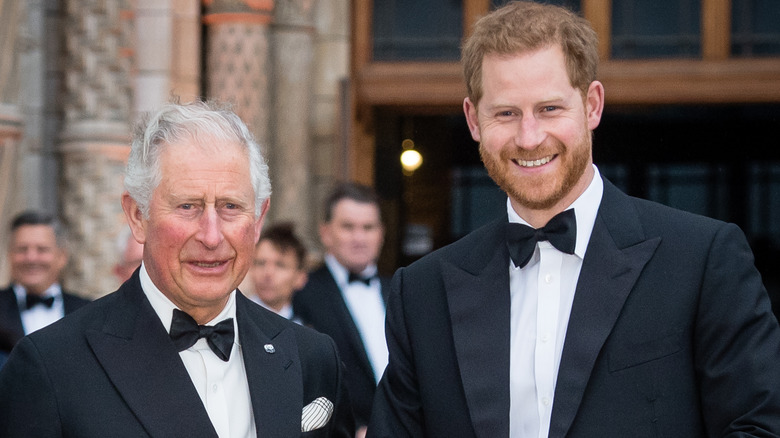Must Read
King Charles Cuts Financial Ties with Prince Andrew: A Royal Family Rift Unfolds
In a surprising turn of events that has sent shockwaves through the royal family, King Charles III has decided to end the annual financial support of one million pounds previously granted to his brother, Prince Andrew.
This decision, which translates to approximately 83,000 pounds each month, raises eyebrows and ignites questions about the future of the Duke of York.
What prompted this significant shift in royal finances, and what does it mean for Andrew moving forward?
For years, Prince Andrew enjoyed a lavish lifestyle funded by the royal purse, a practice that began under the reign of Queen Elizabeth II.
This generous allowance covered everything from maintenance of his opulent residence, Royal Lodge, located in the picturesque Windsor Great Park, to his personal expenses.
However, with King Charles at the helm, the winds of change are blowing through the monarchy, and Andrew has become the first casualty in this new era.
The crux of the issue appears to stem from Andrew's reluctance to vacate his beloved Royal Lodge.
To him, this grand estate is not merely a residence; it represents a sanctuary steeped in royal heritage and personal memories.
King Charles has expressed a desire for Andrew to downsize, but the Duke's attachment to his home complicates matters.
It's not just about real estate; it's about identity and legacy.
King Charles has long envisioned a streamlined monarchy, one that reflects modern values and fiscal responsibility.
His decision to withdraw Andrew's financial support is emblematic of this vision.
The King aims to reshape the royal family's public image, aligning it more closely with the expectations of contemporary society.
This move indicates a commitment to accountability and a departure from the traditional privileges that have characterized royal life for generations.
The implications of this rift extend beyond just the two brothers.
The relationship dynamics within the royal family are shifting, with Prince William emerging as a key ally for Charles in his quest for a modern monarchy.
William's popularity and growing influence could play a crucial role in shaping the future of the royal family, especially in light of Prince Harry's exit from royal duties, which set a precedent for seeking independence.
As Prince Andrew faces this financial upheaval, his future appears uncertain.
He may need to tap into his own resources to maintain his lifestyle, a daunting task given the costs associated with Royal Lodge.
The prospect of reinventing himself outside the royal framework looms large, though it remains to be seen whether he can adapt to a life detached from royal support.
This situation also invites broader reflections on the monarchy's relevance in today's world.
Public sentiment toward the royal family has become increasingly scrutinized, with many questioning the justification for funding a lifestyle detached from public service.
King Charles seems acutely aware of this sentiment and is taking steps to ensure the monarchy remains relevant in a rapidly changing societal landscape.
The ripple effects of Charles' decision could redefine expectations for younger royals as well.
Princesses Beatrice and Eugenie, who currently enjoy royal benefits while pursuing their careers, may find themselves facing new pressures to contribute meaningfully to the royal duties.
Meanwhile, the younger generation, including Prince George, Princess Charlotte, and Prince Louis, will likely be held to higher standards of public service.
Many are left wondering how the late Queen Elizabeth II would have handled this situation.
Known for her unwavering support of family, her approach may have differed significantly from her son's.
Charles' willingness to make tough decisions signals a shift in leadership style, prioritizing the monarchy's future over familial ties.
As the British public watches closely, the financial intricacies of the royal family come under scrutiny.
The sovereign grant, which funds royal duties, is a complex web that includes private wealth and public resources.
By cutting Andrew's allowance, King Charles may be taking a small but significant step towards ensuring that royal finances align with public expectations.
In the grand scheme, this decision could mark a pivotal moment for King Charles' reign.
It underscores his commitment to reforming the monarchy and establishing a legacy rooted in accountability and transparency.
As he navigates the delicate balance between family loyalty and royal duty, the future of the monarchy hangs in the balance.
Ultimately, this royal drama provides insights into the broader themes of family dynamics, privilege, and responsibility.
It serves as a reminder that the challenges faced by the royal family are not so different from those encountered by many families navigating issues of duty and expectation.
As Prince Andrew contemplates his next steps, the monarchy itself must adapt to a world that demands greater accountability and relevance.
The unfolding saga invites us to reflect on the evolving nature of royalty in the 21st century.
Will this be the dawn of a new era for the British monarchy, one that prioritizes service over status?
Only time will tell, but one thing is clear: the days of unchallenged royal privilege may be numbered.




































